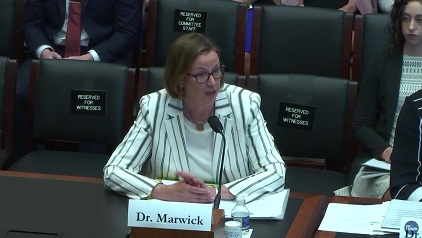
 With a national call to reform higher education to better support all students and
overhaul the federal Higher Education Act, the House Education and Labor Committee
is seeking new approaches that help achieve both quality and equity.
With a national call to reform higher education to better support all students and
overhaul the federal Higher Education Act, the House Education and Labor Committee
is seeking new approaches that help achieve both quality and equity.
Provost Judy Marwick provided insight into the work Harper College is doing, testifying on Wednesday at a bipartisan hearing, “Innovation to Improve Equity: Exploring High-Quality Pathways to a College Degree.”
Chairman Bobby Scott (D-Va.) opened the hearing by underscoring the importance of reimagining outdated concepts of postsecondary education.
“Congress has a responsibility to explore innovative strategies that provide more students the support they need to complete college and reach their full potential,” he said.
In her oral testimony, Marwick highlighted expanded dual credit efforts and the Power of 15, an initiative founded on the premise that most high school students should be able to graduate from high school having earned 15 hours of college credit. Attaining 15 college credits is also a tipping point that predicts student persistence and completion.
Marwick shared the following results:
The work is the result of the transformational partnership Harper and its three sender high school districts (Districts 211, 214 and 220) established, the Northwest Educational Consortium for Student Success.
“Not only do such collaborations promote postsecondary education, but dual credit classes empower students to believe they can achieve at the college level by already completing such courses,” Marwick said.
Ranking Member Virginia Foxx (R-N.C.) also called on Congress to adopt policies that reflect today’s college students: 37% are 25 years and older; 49% are financially independent from their parents; and 64% are working while taking classes.
“And yet the federal government and higher education sector too often continue to cater to an outdated vision of higher education,” Foxx said. “This stubbornness in policy has resulted in mountains of debt, low student completion, dissatisfied employers and a lack of accountability for poorly performing institutions.”
Marwick called on Congress to address some of the challenges Harper and its high school districts faced implementing the Power of 15 including the cost of tuition, data sharing and the credentialing of high school teachers.
Marwick recommended making Pell grant funding available to low-income high school students; establishing incentives for institutions and school districts to establish partnerships such as NECSS and align curriculum, reduce remediation and offer dual credit courses; and reviewing student privacy regulations that can deter such partnerships.
The panel of witnesses providing testimony also included Tomikia LeGrande, vice provost for strategic enrollment management at Virginia Commonwealth University; Charla Long, executive director at the Competency-Based Education Network; and Sameer Gadkaree, senior program officer at the Joyce Foundation.
Watch the hearing here.